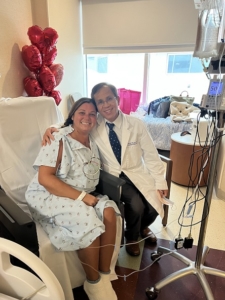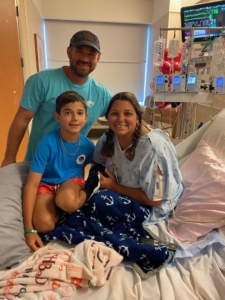The Heart of a Tax Collector
September 2023:
Sara Burgess of St. John’s County knew about arrhythmogenic right ventricular dysplasia (ARVD) from a young age. ARVD is a rare form of cardiomyopathy that occurs when the heart muscle of the right ventricle is replaced by fat and/or fibrous tissue. Sara’s father, grandmother and three uncles all passed away before the age of 40 because of ARVD. Since ARVD is a hereditary gene, her mother started getting Sara tested when she was a child. It wasn’t until 2013, at the age of 33, the same age her father was when died of ARVD, that Sara received her first abnormal heart evaluation indicating an increase in ARVD symptoms. Sara was officially diagnosed with ARVD, and the next day, the doctors at Flager Health+ in St. Augustine placed a defibrillator in her chest. They recommended that Sara have tests done at John Hopkins Hospital since they were researching ARVD.

Sara with Mayo Clinic heart transplant surgeon.
After the placement of the defibrillator, Sara had no signs or symptoms of ARVD for almost 10 years, but in December 2022 Sara started experiencing ventricular tachycardia (VT) which is a rapid, abnormal heart rhythm or arrhythmia. Prolonged VT, even just for more than a few seconds at a time, is dangerous and can become life-threatening. Sara went to back to Flagler Health+ for a heart catheterization, and her doctor immediately saw the blockage in her heart. Her doctor told her that in the next 10-15 years she would need a heart transplant. Five days later Sara had multiple blood clots and was referred to Mayo Clinic Hospital in Jacksonville.
By February 2023 Sara’s heart failure was having a negative impact on her kidneys. She was experiencing VT episodes regularly and was admitted to the Mayo Clinic for a week, where she was told she would need a transplant. After completing the transplant evaluations on April 8, Sara was placed on the transplant waiting list as a status 4. Sara was able to still go to work at the St. Johns County Tax Collector’s office, until June 20, when she was admitted again to the Mayo Clinic. Due to Sara’s VT episodes the Mayo Clinic wanted her to stay in the hospital until she received her heart, which they anticipated would take two to four months. Five days later Sara received a call that a heart was available to her, but wasn’t meant to be; it was what they call a dry run. Three days later Sara got a second call saying that another heart was available, and this one was it. On June 30, 2023, Sara woke up with a new heart.
“I was in shock,” said Sara. “They told me I would be waiting in the hospital for months, and it took 10 days!”

Sara waiting for a heart at the Mayo Clinic with her husband and son.
Since receiving her new heart, Sara is grateful for this second chance at life.
“I should be given a new birth certificate,” Sara said, explaining how this new heart makes her feel like a new person. “I couldn’t walk to the mailbox without stopping to breathe.”
Now Sara is able to go on long bike rides with her husband and play with her son. She is so thankful for her donor and donor family and plans to write a letter to them this fall verbalizing her gratitude to them.
Sara also looks forward to taking this experience back to work where she regularly registers new drivers on Florida’s organ and tissue donor registry. With her new outlook on life, Sara now has a first-hand experience to share with new drivers when they have questions about organ donation.
“I am very protective of Donate Life, because one, yes, really did save my life.”







